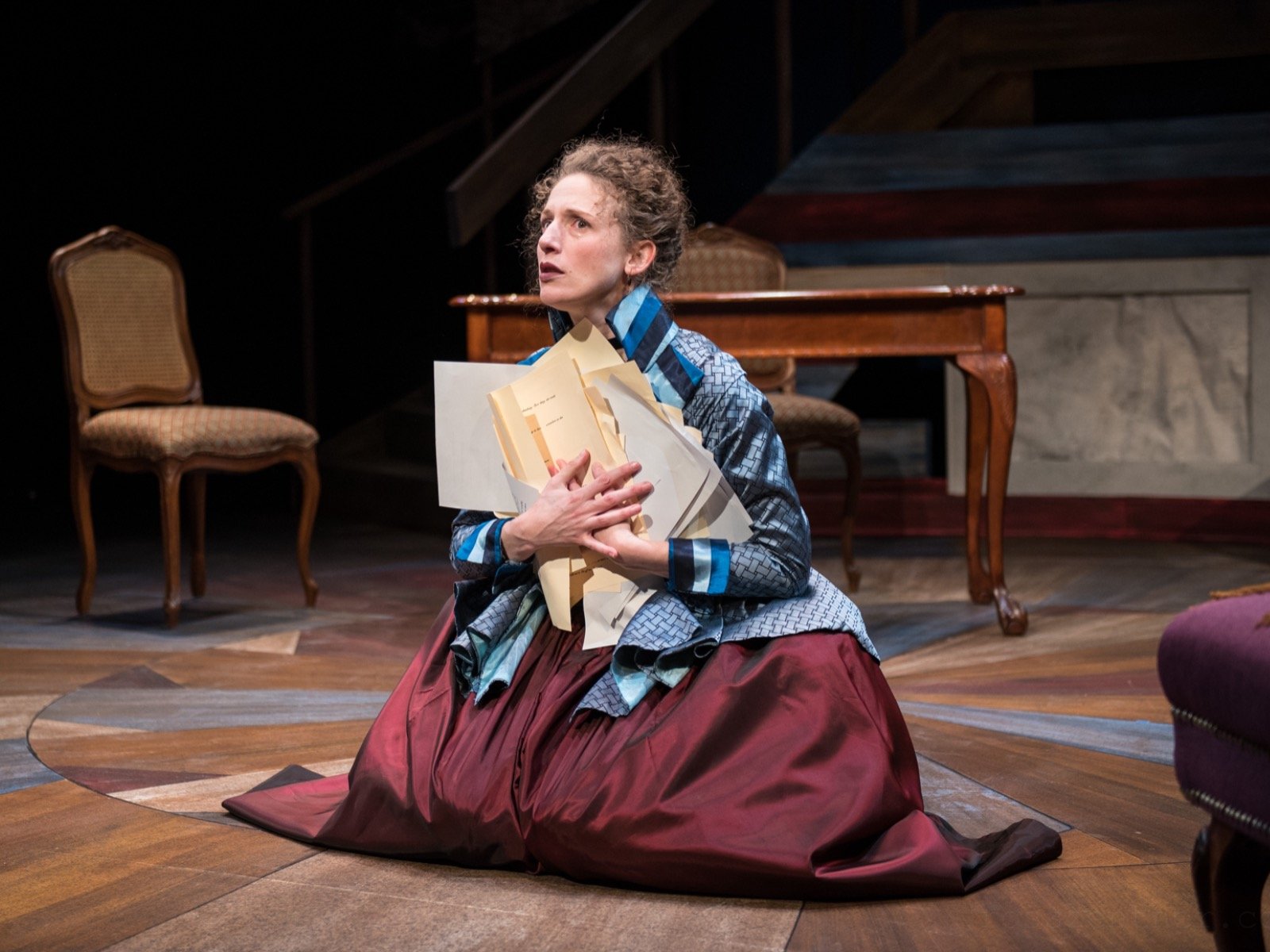"There’s a lot of pressure to write something profound these days."
Lauren Gunderson gives this line to her protagonist, 18th century French writer and political activist Olympe de Gouges, but the uber-popular playwright may be expressing her own angst here. It’s part of the first scene of "The Revolutionists," which opened Next Act Theatre’s 2019-2020 season over the weekend. Directed capably by Laura Gordon, it’s a pretty good production of a not very good play.
It seems Olympe (a fast-talking, no-nonsense Cassandra Bissell) is having trouble starting her next play and struggles with her desire to write something that is both crowd-pleasing and important. It’s a task that she assures us is very difficult, as she casts around for catchy titles and subplots. (Maybe it’s called "The Revolutionists!" Maybe it’s a musical! Maybe it’s tantalizing but really vague and annoyingly prescient!)
In the midst of the French Revolution’s Reign of Terror, a lot of writers and activists are literally losing their heads to the guillotine, but "That’s not a way to start a comedy," Olympe proclaims – just after sound effects of the famed method of execution open the show. This is the first batch of many, many metatheatrical asides that Gunderson presents to the audience, wrapped in insider-y and self-congratulatory bows. As if a play about a writer writing a play while being visited by an array of inspiring subjects wasn’t strained and indulgent enough.
As Olympe works through her writer’s block, she is interrupted by a trio of women – two other real historical figures and one fictional – who implore the playwright to use her skill with words to secure their legacies in the annals of history. The first, Marianne Angell, is an invented character representing rebels in the French colony of Saint-Domingue. Pleading with Olympe to write pamphlets about abolishing slavery there, Marianne (an earthy and earnest Leah Dutchin) scolds the writer to use her gifts to create change rather than worrying about laughs or reviews.
Her next visitor is Charlotte Corday, a young woman requesting an impressive final statement, since her planned murder of the radical journalist Jean-Paul Marat will surely lead to her execution. A tightly wound Eva Nimmer caresses a kitchen knife and hits her "Stab! Stab!" lines with the perverse glee of someone who feels that her mission is urgent and just. (Inexplicably, in a play that markets itself as a feminist fantasia about "badass" women that history forgot, the other characters assume Corday is driven to murder because she loves someone who doesn’t love her back.)
Finally, everyone’s favorite out-of-touch, constantly misquoted French aristocrat Marie Antoinette stumbles in, (a delightfully child-like Bree Beelow) wearing oversized sunglasses and a pale pink wig that resembles an enormous dollop of whipped cream. Audiences may know her as the clueless caricature of privilege who couldn’t understand, let alone empathize with, her starving subjects. But in "The Revolutionists," she is portrayed as all this, plus someone who likes dogs and children and frequently speaks her stage directions out loud. Sigh. Not much character rehabilitation there.
In lieu of a plot, the characters talk about themselves and the way they want to be remembered. They wring their hands at their lack of power and wait for their turn at the guillotine. In an act of "sororite," they also comfort one another. Because they are women.
In this trite, talky play, the best moments are visual. The scenic design, by Samantha Gribben, is a creative rendering of guillotine blades splattered with the French national colors red and blue. Sepia-toned pages filled with writing rise up to meet the imposing wedges. And when three of the four characters face their deaths on the scaffold, they are bathed in a heavenly white light and stand even taller after the murderous blade descends than they did before. Their martyrdom is glorious, due to large part by effective lighting design from Marissa Abbott.
Speaking of visuals, part of the fun of period pieces is reveling in the costumes – particularly when they are as elaborate as the enormous wigs, wide panniers, rococo details, ruffles and frills that mark the era of the French Revolution. But instead of rich clothing that denotes the excesses of the time – and the widening chasm between the upper and lower classes – Jason Orlenko’s costume design pairs strange fabrics and colors together and adds odd trimmings to pieces that don’t fit quite right. Even Marie Antoinette’s voluminous white gown misses the mark with cascades of tiny ribbons that make the dress read as cheap rather than elegant. And the black executioners’ robes look like bargain bin finds from a Halloween store.
The real problem with "The Revolutionists" is that Gunderson pretends to educate audiences about real women from history while simultaneously reducing those women to types, omitting their actual achievements and manipulating them for cheap punchlines. As in her other work that highlights historical figures ("Silent Sky," "The Book of Will") Gunderson never lets facts get in the way of a cute plot shortcut, an easy laugh or a quick quip. While her characters argue that theater is important, her work doesn’t bear that out.
A cursory glimpse at a Wikipedia page will tell you that the real Olympe de Gouges would never need to be convinced to write about slavery, the rights of women or a host of other social issues. And rest assured, she did not use that moment on the scaffold to worry about future productions of her own plays. Again, maybe that was Gunderson expressing her own angst.







